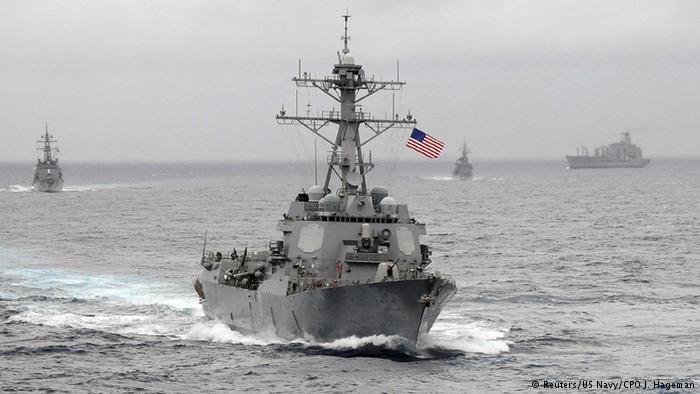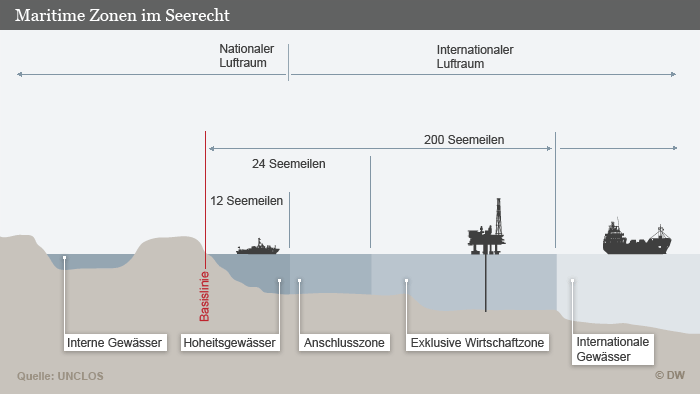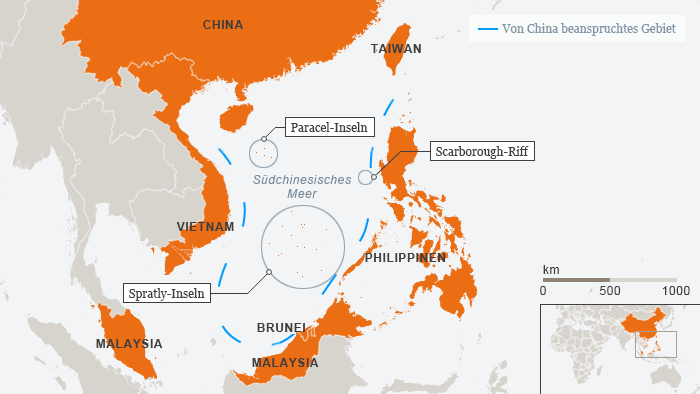China
“Freedom of navigation must be discussed”
In the interest of all Involved must be to free navigation in the South China sea to the test, asks Peter Kreuzer in an Interview with DW. The different levels of the conflict need to be clearly separated.

In the disputes in the South China sea is on the first view to the enforcement of the
Territorial claims of neighbouring States. In the Background, but when it comes to much more. It is a test of strength between the old superpower USA and the emerging superpower people’s Republic of China. An important part of the dispute concerns the international order, in particular the
Convention on the law of the United Nations (United Nations Convention on the Law of the Sea: in short, UNCLOS). It regulates the rights and obligations of States in regard to the world’s oceans. UNCLOS entered into force in 1994. But the agreement has not all ambiguities are eliminated. China in 1996, UNCLOS ratified, while the United States and until today, not a party.
Deutsche Welle: What is your opinion, in the core of the disputes in the South China sea, if we have the positions of the people’s Republic of China and the United States in the view?
Peter Kreuzer: These two powers is less about the Territorialstreitigkeiten but rather the question of what is the right of foreign warships in the various sea basins from foreign shores.
The United States formulate the generally called “freedom of navigation” and try the widest possible Alliance together. Simply because all the countries of this world, of course, a great interest in the freedom of commercial navigation.
In the Background there is the question of what the rights of military vessels in coastal waters of foreign States should have. And since the interpretations of the international Maritime law of the United States and China apart. China argues that the coasts of certain rights for the respective coastal States over foreign States must exist, there with your “gunboats” may be able to operate. The US argue by contrast that such rights only in the territorial waters can be valid.

Peter Kreuzer from the Leibniz-Institute of the Hessen Foundation for peace and conflict studies
Why is it so hesitant, in international discussions, China, this is the Position taken?
This is a difficult question. I think this has to do with the history of the conflict to do, but also with the perception of the confrontation with the United States in China. In China the conflict as a confrontation between the two superpowers understood, and although as between the old and the new. And in this controversy is the international forums of the Chinese side, paid little attention to.
Another reason is that the different dimensions of conflict in the South China sea as a coherent and rarely to be considered separately. The territorial dispute with the neighbouring countries would actually be differentiated from the disputes over maritime rights. In the first case it is mainly the customary international law, and in the second case, it would be the law of the sea. And it would be finally, the question of freedom of navigation, to separate, as it affects the international community beyond the Region. Both in China as well as in the United States lacks this separation.
Is the Background for the Position of China is not perhaps the that it is the prevailing international order refuses, because this is from the West, especially the USA, is dominated?
China rejects the international order, of course not. In almost all cases, China in the framework of the international order. It, however, has a strong focus on UN-based regulations. This means that in the West, so prominent, has become the “coalition of the willing” (under the aegis of the USA, Anm. d. Red.), as in Libya, Syria, or previously in Afghanistan has given of China is extremely critical. So it would be from a Chinese point of view is quite reasonable, indeed even necessary, in the international negotiating process.

The Seerechtsabkommen the United Nations defines different ocean zones
What are the China’s ideas concerning a revision of the different marine zones?
It goes in the Zwölfmeilenzone to the question of free transit for military vessels. The wants China not dispute. But China demands a control of the respective coastal state about when, where and how foreign Military ships go. This goes above and beyond what is in the codified law of the sea applies. Since China is in a line with other States, such as Brazil, Pakistan or India. However, these are seen internationally in a minority.
When it comes to the exclusive economic zone goes, it goes to the old question, whether this protective function should have, what the major Maritime powers to reject it. You say: no, we need this Option on operations from foreign shores, to order international to enforce. That is of course, a certain order to enforce, in the interest of these great powers. And this is the, whereas China applies.
If you Fragekomplex the zones from Territorialstreit in the South China sea uncouples and international negotiations, would the forequarters first time no solution for the conflict over sovereignty and maritime rights offer. Because there is a question of how far the claims about Vietnam’s rich and where Chinese claims overlap. These questions can not solve the problem.
However, is to assume that at the Moment the cooperative in the General panel works, also temporary solutions for concrete issues in the South China sea to develop.

The claims of China in the South China sea, marked by the so-called Nine-dash-line
Where do you see chances that this alternative approach on the international Agenda?
Here are a number of actors possible. For one, it is conceivable that a whole range of ASEAN States the Position of the United States, the Philippines and Vietnam not more mitträgt, what the joint statement of the United States with the ASEAN countries had shown. These three countries want the conflict to territorial sovereignty international and very strong in the sense of a community of Good, against a rauhbeiniges China, the international law is not compliant with replacing.
If, however, the question of the freedom of navigation of the Territorialstreitigkeiten decoupled, they would be südostasiatsichen States, the effect similar to think like China, certainly have an interest in this topic on the international Agenda. However, this is complicated, because ASEAN is a Kollektivorgan is and, therefore, must also States, like the Philippines and Vietnam, to a certain extent follow suit.
Another Chance offers itself through Europe or even Germany, who accept that certain areas of the international law of the sea is still controversial, or are unclear, although the content is not the Chinese Position parts. Nevertheless, Europe and Germany because of the disputes and the Zündkraft the conflict, and to be ready to renegotiate to enter, or at least a discussion in this direction can be promoted.
The political scientist and sinologist Peter Kreuzer is a Board member and Research associate at the Leibniz-Institute of the Hessen Foundation for peace and conflict studies.
The Interview was conducted by Rodion Ebbighausen.
